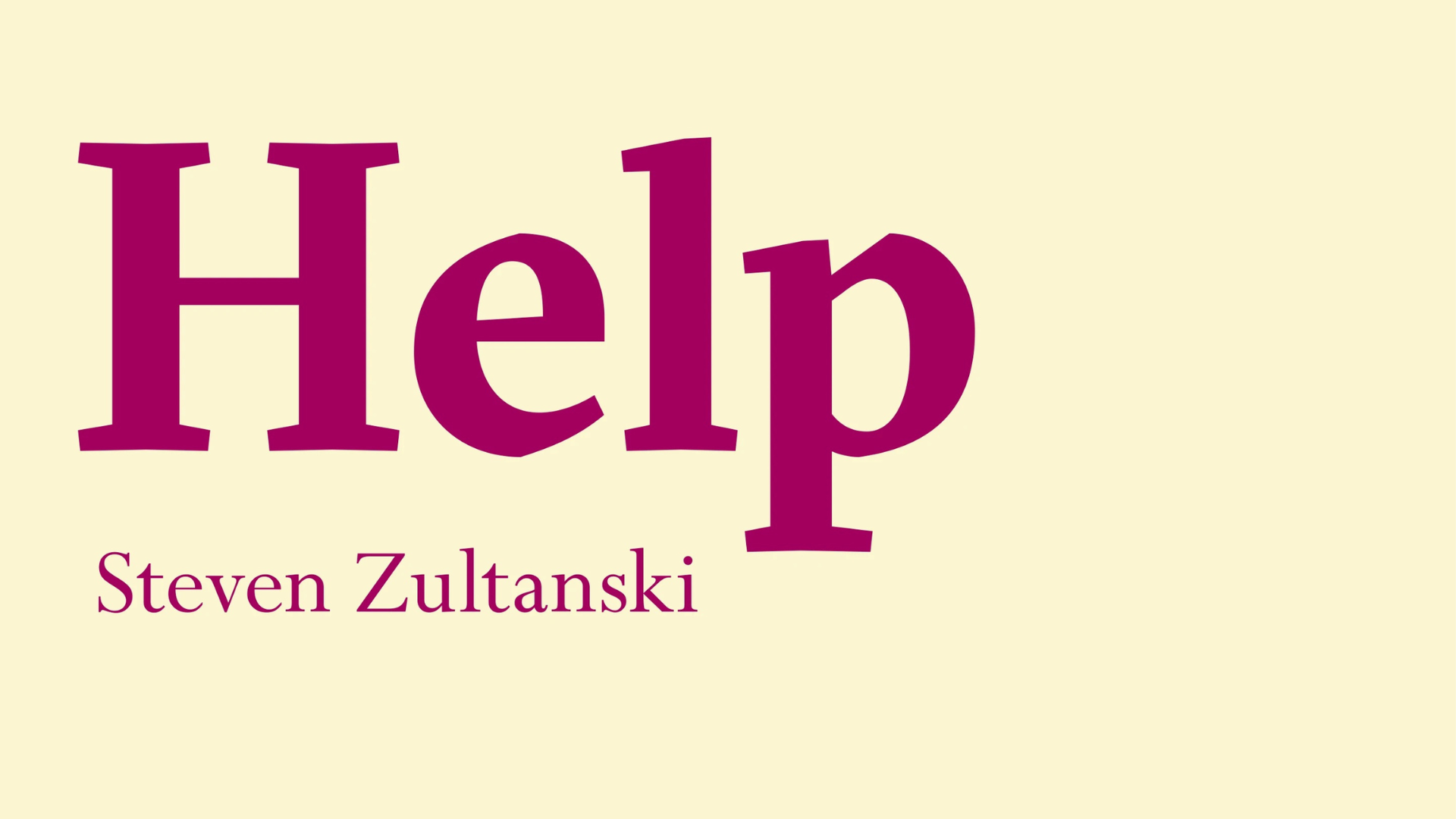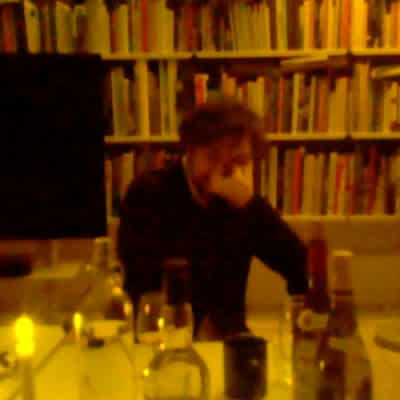
Credits:
Steven Zultanski, poet and writer
August 1, 2024
The following text was written for a joint book launch at Montez Press Radio on May 3, 2024. My new book of poems, Help, was launched alongside new books by Marie Buck and Matt Walker, Emily Martin, and Jennifer Soong.
For reasons explained below, I decided not to read directly from the book and instead prepared this text. For publication in On Mind, I’ve lightly edited it, clarifying some ideas and rewriting certain lines that in retrospect struck me as too cheap, or attention-grabbing, or self-deprecating, or audience-pleasing.
*
It’s not entirely true, but I like to say that the four poems in Help were mostly built by setting up conversations and games between friends which I then transcribed, edited, and embellished.
These conversations and games took place in domestic settings, where quiet intimacy provided a permissive context for the expression of feelings which are usually subject to mild repression and social correction, feelings that can be considered childish: morbidity, whininess, silliness, and detachment. Such emotions are often treated as antisocial in public or professional settings, but in my experience, they are inherent—and perhaps often foundational—to close friendships. Friends whine at each other. They giggle at bad jokes. Their voices rise in enthusiasm as they gossip about horrible things.
Help takes these voices and pins them to the page, flattens them, displays them in a kind of vitrine. The resultant poems mostly look like scripts for unrealized plays. They recall the aesthetic experience of reading drama on the page, which often feels incomplete, as if the play itself is inaccessible, elsewhere.
For this reason, it doesn’t make sense for me to read aloud from Help. Reading from it would produce a sense of immediacy that the work is trying to refuse. So rather than perform the book, I’d like to simply describe each of the poems.
*
The first poem is called “Breakfast’s Ready.” For this piece, I gathered a group of friends and asked them to have a conversation about people who died that they didn’t know very well: acquaintances, neighbors, teachers, classmates, coworkers, etc. To exaggerate the sense of secular ritual inherent to the prompt, I brought a large number of spatulas and instructed everyone to throw a spatula before telling a story about a death. Our conversation lasted for about four hours. I then transcribed it, edited it, and inserted a number of short prose sections that fictionalize the occasion. These sections describe the participants gathering very early in the morning and eating a large breakfast as they converse. Shoehorning fictional material into the transcribed text somewhat damaged but didn’t ruin the illusion of documentary—editing it seamlessly together was a way of treating the transcription, the raw material of the work, as an outcome rather than as a source.
Predictably, the stories about people who died are sad and awful. And there are a lot of them: the conversation goes on and on. Rather than talk about recent occurrences, the participants tended to dwell on early encounters with death, experiences from their childhoods. Therefore, the conversation is dominated by half-remembered anecdotes of children dying, mysterious suicides, and teachers who never came back to class. The level of detail varies from story to story, and there’s quite a bit of unverifiable gossip and rumor.
By organizing and moderating this somewhat contrived discussion, I was looking to provoke people to talk about death in a way that would allow for their fascination and titillation to freely emerge. If one is talking about the death of a loved one or a friend, then heartfelt emotion and reverence for the deceased are often the dominate tones of the conversation, for obvious reasons. But when one is talking about acquaintances who have died, another relationship to death can come to the fore, more voyeuristic and perverse. One can ask probing or inappropriate questions. One can display a curiosity about what death is, what it means, how it works. Gossiping about the death of an acquaintance is an opportunity to feel close to the mechanics of death: the reality of it, the sociality of it, the grotesquerie of it. It’s not necessarily disrespectful, but it’s not respectful either. Talking about death in this semi-detached way can bring people closer together—it’s a chance to bond over shared morbid fascination.
*
The second poem is called “Unfair.” This piece features the most conventionally poem-like writing in the book: short verses in which a speaker repeatedly demands endless love, though not from anyone in particular. Each page introduces a new need: the need for love over time, the need for love from as many people as possible, the need for love to be painful, etc. These verses are interspersed with brief and poignant interviews with friends about places where they have hidden or found respite (in bushes, sheds, basements, closets, and so on), either as children or adults. Lurching between these two modes, the poem juxtaposes an always unfulfilled desire for more love (rendered in a somewhat plain but nonetheless mannered poetic style) with an always unfulfilled desire for social withdrawal (rendered in a style that pretends to replicate natural speech).
Perhaps inevitably given its subject matter, “Unfair” is a cloying and potentially irritating poem. In order to take neediness seriously, I had to risk writing a rather unlikable text—but I think that it’s precisely in its cloying persistence and untiring insecurity that it has a chance of ringing true.
The poem doesn’t pathologize need, but it doesn’t shy away from pathologizing either. It’s probably nearly impossible to avoid pathologizing in our culture, which is saturated with psychology and interpretation. At the moment, there is a cultural tendency to impose pathological meaning onto even the minutest behaviors and gestures of others—often, this operation is displayed as evidence of knowledge or authority. I don’t think a writer can escape this situation, but one can use it consciously. Here, I hoped to use psychology as a lure rather than as an explanation, offering a false promise of access, which can nonetheless be just as moving and in some instances more moving than an offer of purported genuine access.
*
The third poem, “A Glass of Water,” is the most conceptually and formally simple text in the book. For this piece, I recorded myself asking my girlfriend Ida if she wanted a glass of water 21 times over the course of a single day. It was a slow day, a Saturday.
The form of the poem is very simple, almost too simple. There are just a few lines of dialogue per page, transcriptions of each interaction. The poem takes a familiar domestic action and baits one into reading it as repetitive, mechanical, and narcissistic. Filling a glass of water is transformed into an excessively pleasing and desperate performance. It’s almost laughable, pathetic. But for all of that, “A Glass of Water” is also a straightforwardly sweet text—a skeletal love poem based on a single repeated gesture.
*
The final poem, “Help,” is the longest in the book. Similarly to “Breakfast’s Ready,” it reads like a script for a non-existent play. In this piece, four friends are sitting around a table, playing a game that involves remembering sentences they used as children or adolescents to protect their privacy: things they said when they wanted to end a conversation, to shut down a response, or to be left alone. They list sentences like, “Go away”; “I don’t care”; “Who cares?”; “I don’t want to talk about it”; “Leave me alone”; and so on. There are a ton of these sentences, they all get stacked up in a pile.
Twice in the poem, the participants take a break from the game and talk in a meandering way about their daily lives and memories. These sections attempt to represent the formlessness of digressive conversation, and they are meant to infuse the whole poem with the aura of affectionate friendship.
To what end? Well, I’m not interested in representing friendship accurately, or in inducing a vicarious experience of friendship in the reader. Rather, I’m interested in how spaces of intimacy are also exclusionary spaces, and I’m interested in using that exclusion as a formal principle. Listening in on others’ friendships can provoke flickers of sympathy and secondhand goodwill, but it can also be alienating. One can’t join in. Their warmth is not your warmth. Reading an account of friendship creates a sense of presence at a remove—like listening through a wall—putting the reader in the position of the voyeur, someone who is enjoying other people’s intimacy but is denied participation.
*
In fact, I wanted all of the poems in this book to put the reader in the position of the voyeur, though that’s never explicitly thematized. But one of the ways I think about Help is as a book for people who enjoy voyeurism (most people?). Another way I think about it is as a series of transcribed games—linguistic games, social games, power games. Another is as fictionalized performance documentation. Another is as a book of dance, not only because it involves representing bodies as moving or sitting or fidgeting, but because both the characters’ movements and their words are left unadorned by commentary, as open-ended as silent gestures.
Throughout Help, I carefully modulated the tone to allow for ambivalence. Though in many lines the speakers’ emotions are direct and legible, the book’s general tone is confusing enough that it might be read in different ways, depending on who is reading it. The indeterminacy of the tone functions as a screen (though not a blank screen) onto which the reader projects their assumptions or feelings. This is not because I’m interested in addressing or connecting with the reader, but because I’m interested in thinking about the structural position of the reader as part of the medium of the work.
That said, I didn’t court ambivalence or confusion for intellectual reasons. Help is not an intellectual book. In fact, I trust that it is much dumber than this description of it. Rather, I was determined to walk a tightrope of ambivalence for a very straightforward reason: to me, ambivalence is moving. In my experience, other people’s voices and stories stir something in me not only because they mirror my own way of expressing things but also and more importantly because they are somewhat undecidable and sometimes disorienting. Someone else’s words, gestures, and emphases can never be flattened into knowledge (not that I’m against knowledge, but I’m against turning other people into knowledge). When a friend tells me a story, I don’t fully know what it means or what they are trying to tell me. They continually surprise me, and my efforts at understanding are always at least a little off the mark. I assume many other people share this experience—it can hardly be unique. In that context, the poems in Help are simply attempts to render familiar feelings without judgment or justification. The overall effect of the book, I hope, is a kind of thwarted realism.

BIO
Steven Zultanski is the author of several books, including Help (Golias, 2024), Relief (Make Now, 2021), Bribery (Ugly Duckling Presse, 2014), and Agony (Book'hug, 2012). With the artist Ed Atkins, he co-wrote and co-directed Sorcerer, a theatrical project which has been realized as a play, a film, and a book (Prototype, 2023). He lives in Copenhagen.
To purchase Help, visit Golias's website here.